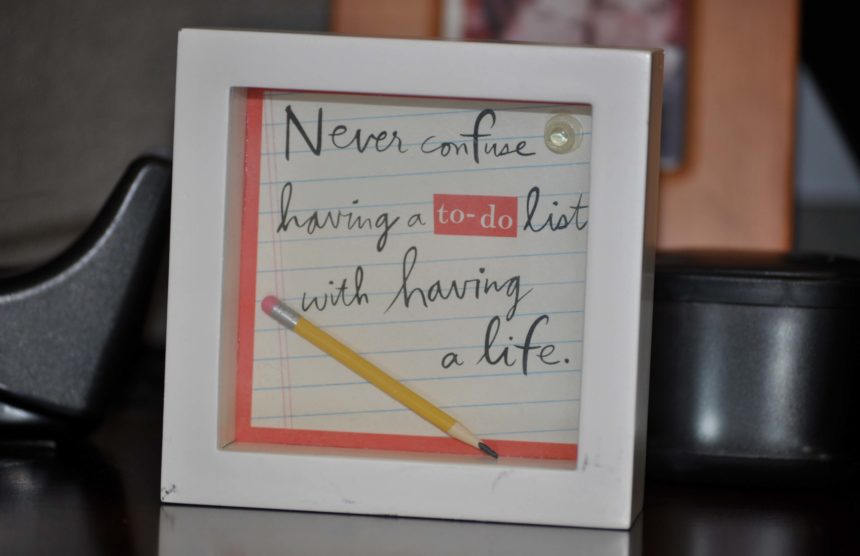Motivation is “the Why.” It’s not the things we do, but the reason for doing them.
On my desk is a little plaque that I found many years ago. It says, “Never confuse having a to–do list with having a life.” It’s a tiny four–inch by four–inch shadow box that has found its way into prominence in every office I have ever had over the past 15 years as a Salvation Army officer. On many days I have not lived up to the advice of this junky little square of laminated pressboard. It just sits there, shaming me, as I make my lists and check things off, patting myself on the back for accomplishments that I too often let define me. I even write down things that I have already done just so I can cross them off. And I know I am not the only one who does that!
When we are busy, we don’t often ask why we keep doing the things we do; we just keep doing them. Inertia being what it is, we know if we stop we might break down; so we take a deep breath and press on. This law of motion isn’t a force that determines direction. Inertia just determines that we will keep moving until something makes us stop or moves us another way. We focus on what’s next on the list, hoping that by the end of the day the list will be empty. But if we are waiting for the ending of our to–do list to be the external factor that stops us, it’s never going to happen. We go on assuming that if there are things in front of us to do, they must be the things we are meant to do, and that we are doing the right thing by doing them. But is this true? And why these particular things? What makes us keep doing them?
Motivation is “the Why.” It’s not the things we do, but the reason for doing them. If you were to look closely, what would be the reason at the root of everything you do? And let’s get past the usual answers and the mission statement recitations. What is the compelling “why” that makes you do it? This is not an easy or a light question. It should bring up all sorts of internal thoughts and feelings, expectations, external incentives and the idea that our own motivations may be hidden so well that we don’t even realize what they truly are.
We read in Proverbs 16:2, 3 (NIV): “All a person’s ways seem pure to them, but motives are weighed by the Lord. Commit to the Lord whatever you do, and He will establish your plans.” And in Proverbs 16:9 we read, “In their hearts humans plan their course, but the Lord establishes their steps.” When we constantly just do, there is no time to commit and allow the Lord to establish the direction for us. There’s no checks or balances on our motivations, even if it seems like we are doing the right things. We can get into the habit of regarding ourselves as the planners and allow our human motivations to get in the way. Things like pride, jealousy, greed, duty, fear, lust, envy, selfishness and even boredom can prevent us from doing the right things for the right reasons.
We have to be vigilant in making sure our motives are pure and our plans established by God. To do this, we must take the time to stay in step with the One who can deliver us from ourselves. I don’t want to fall into a rut where what once compelled me, pulled me and called me to godly action, becomes compulsory and where I find myself obsessive–compulsive about completing a to-do list of things that God has not established.
I am a “doer” and it’s really hard for me to stop the action long enough to check in on the master plan or to make sure that what I am doing is being done with the right heart behind it. I am good at staying in motion. I am not good at stopping, even if I am moving in the wrong direction. I lose sight of the ultimate goal when I get lost in the minutia of just getting things done. And I forget that the ultimate goal is not to complete my to–do list. It is the hope of an eternity in heaven.
The Apostle Paul talks about this in 2 Corinthians 5 when he describes our longing and groaning for our heavenly dwelling. Verses nine and ten describe how our ultimate motivation should be to please God, as we all will appear at the judgment seat of Christ to receive what is due for the things we have done. And this judgment will not take into consideration the number of tasks I have crossed off my list. It is more concerned with the reason I valued and attempted them in the first place. The ultimate question is not how or what, but why? Am I living for what’s next on my list or for what’s next eternally? I tell people that I want my tombstone to read, “She meant well …” They laugh, but I don’t think I’m joking.
To Consider
- What do you think are the most important things you do? What does God think of those things?
- If you could choose to do anything right now, what would you be most motivated to do?
- How can you determine that the things you are motivated to do have been established by the Lord?
- Does it scare you to examine your own motives, or to let God examine them? Read all of Psalm 139 before answering.
Prayer
“Search me, God, and know my heart; test me and know my anxious thoughts. See if there is any offensive way in me, and lead me in the way everlasting” (Psalm 139:23, 24).

